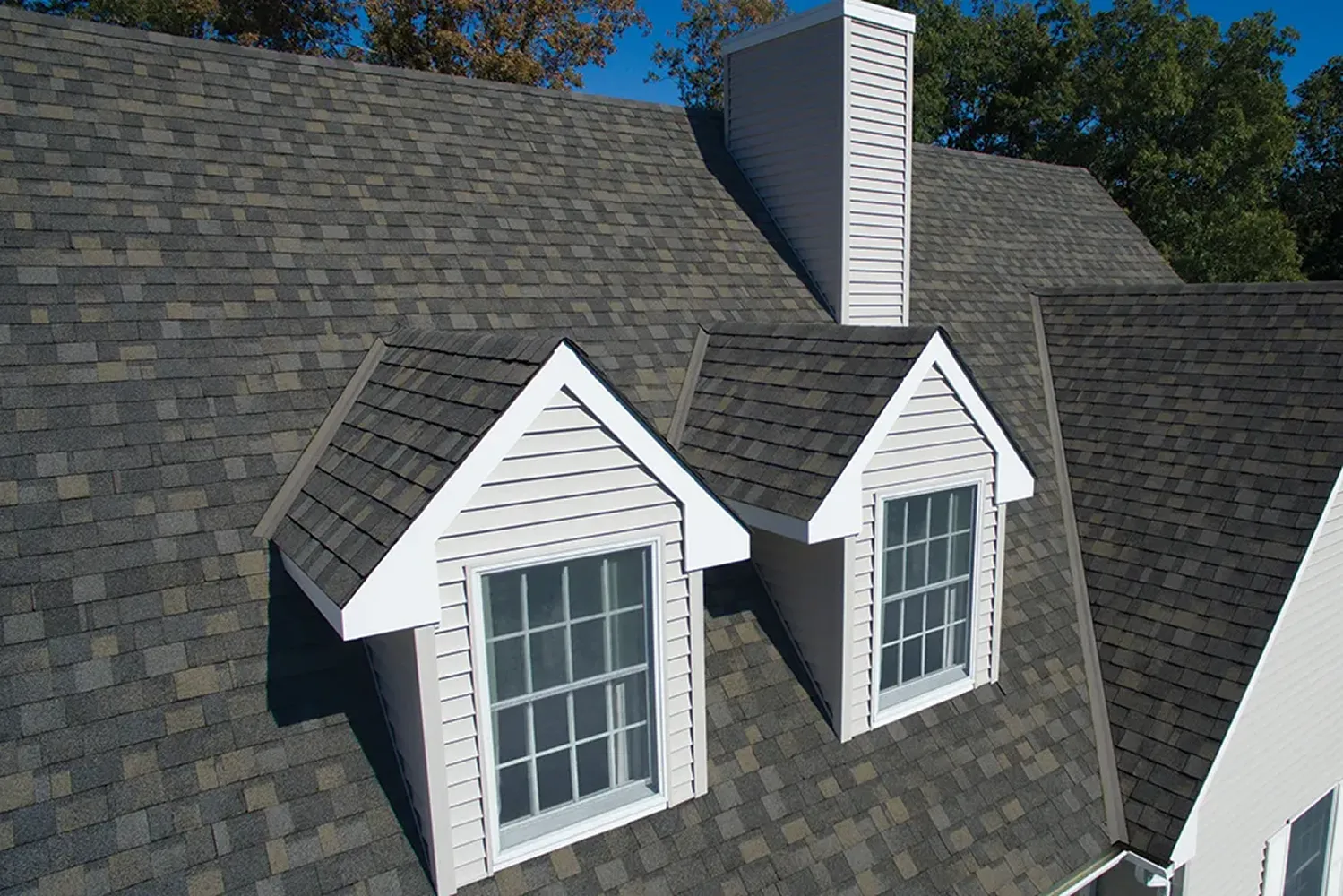The Easiest Residential Roofing Type to Install
Since 2009, we’ve led the industry in providing full-service residential roof installation and maintenance with a commitment to 100% customer satisfaction.
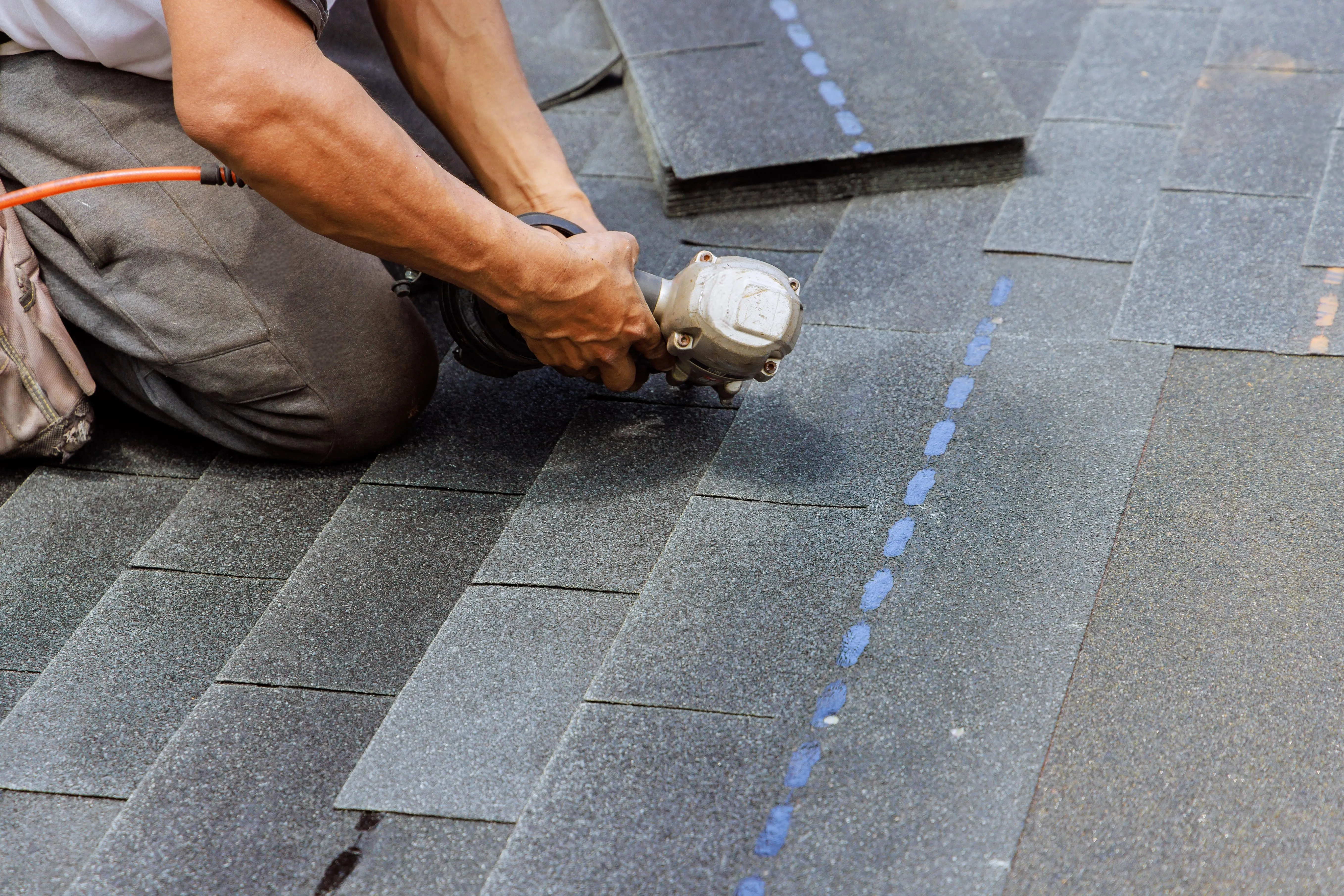
When it comes to roofing types, there’s no one-size-fits-all solution. From the aesthetics to the climate, if want to have the best roof for your home, you have to do your research. And when it comes to finding the easiest residential roofing type to install, the research can be even more difficult and stressful.
You’re faced with questions like: Should you opt for asphalt shingles or metal roofing? Is a flat roof easier to install, or is it too challenging? To help make the option easier, we’re going to break down the basics of residential roof installation and offer the must-know details about the easiest type of residential roofing to install.
Choosing the Right Residential Roof Type
Choosing the right residential roof type for a home may seem daunting, but the process doesn’t have to be overwhelming. When considering what type of roof is best for you, it’s important to consider the climate you live in, your budget, and your particular style preferences.
If you live in a cold climate, then metal roofing is ideal because there are fewer chances that snow and ice will damage it and because metal roofs hold up well against wind and rain. For warmer climates, asphalt shingle roofing is a great choice due to its low cost and wide variety of colors. Additionally, asphalt is energy-efficient, meaning it reduces utility bills, which is attractive to homeowners.
On the other hand, tile or slate roofing can be more expensive than asphalt, but they last longer due to their durability. However, these types of roofs offer benefits like fire protection, so may be a better fit for certain locales. It would be wise to research any suburban codes regarding this as well.
Ultimately, each homeowner will have different requirements when deciding what type of residential roof is best for them. With careful consideration of all factors involved – including budget constraints and climatic conditions – homeowners should easily be able to find the best roofing solution for their needs.
No matter the material chosen, all homeowners should take into account potential related factors before making a purchase decision such as ease of installation, maintenance requirements over the life of the product, expected warranty lengths offered by vendors, and so on.
Benefits Of Different Roofing Types
Looking for a reliable roofing contractor to take care of your residential roofing needs? Look no further than Blue Nail Roofing & Construction! Our experienced team of professionals is ready to assist you with your roofing project, whether you need repairs, replacements, or a full installation.
At Blue Nail Roofing & Construction, we understand that your home is one of your most valuable assets, which is why we take every step to ensure that your roofing project is completed with the highest level of care and attention to detail. From selecting the right materials to providing expert installation and maintenance services, we are committed to delivering the best results possible.
Contact us today to schedule a consultation and let our team help you get started on your roofing project. We’ll work closely with you to understand your needs and budget and provide you with a customized solution that meets your specific requirements.
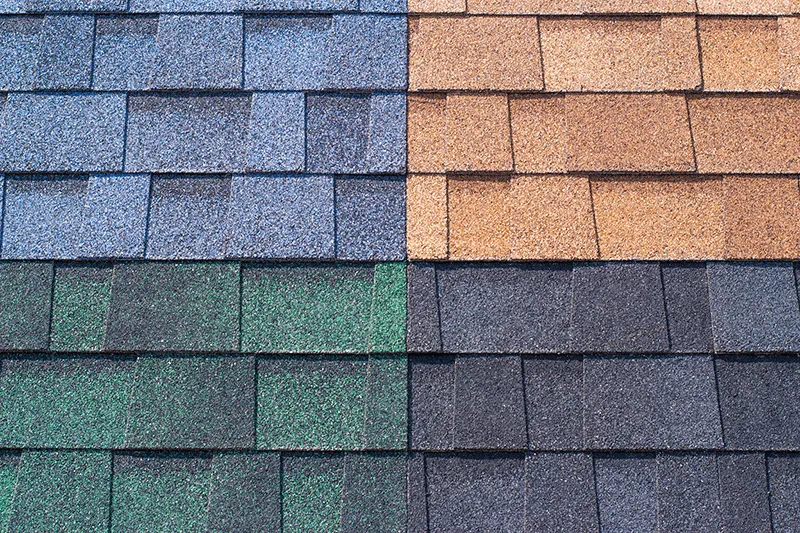
Asphalt Shingles
Asphalt shingles are a popular choice for residential roofing due to their affordability and wide selection of design options. They’re easy to install and maintain, providing good protection against weather conditions like rain, wind, and snow while still allowing some ventilation into the home. Asphalt shingles come in a variety of colors, textures, and shapes, so it’s easy to find an option that complements your home’s exterior design.
In addition, asphalt shingles require minimal maintenance throughout their lifespan compared to other materials such as metal or tile roofs. This makes them a great option for busy homeowners who don’t have much time to dedicate to upkeep.
Although asphalt shingle roofs may be more affordable than other materials initially, they may not be the best long-term solution depending on climate and weather conditions in your area.
For instance, in areas that experience hot summers or heavy snowfall every year, tile or metal roofs may be better suited as they offer superior wear resistance over time. It’s important to consider all factors before making a final decision on what type of material is best for your home’s unique needs.
Metal Roofs
Moving on from asphalt shingles, metal roofs are another popular option for residential roofing. Metal roofs offer excellent protection against harsh weather conditions like hail, strong winds, and extreme heat or cold.
They’re also known for their durability; many metal roofs can last up to 50 years with proper maintenance. In addition, metal roofs are available in various colors and styles, allowing you to customize the look of your home’s exterior.
However, metal roofing is a bit more expensive than asphalt shingle roofing initially. The cost of installation is typically higher due to the complexity of putting together the panels and attaching them securely to your house.
Additionally, depending on what type of metal you choose, you may need to replace parts or refinish the entire roof more often than with other materials such as tile or asphalt shingles.
Despite these drawbacks, metal roofs have some major advantages over other residential roofing materials. Metal roofs are fire-resistant and reflect sunlight away from your home; this increases energy efficiency by reducing cooling needs during the summer months.
Plus, since metal is lightweight compared to other materials like tile or slate, there’s less stress placed on your home’s foundation. All things considered, a metal roof could be an ideal choice if your budget allows it and you don’t mind the additional upkeep that comes with it.
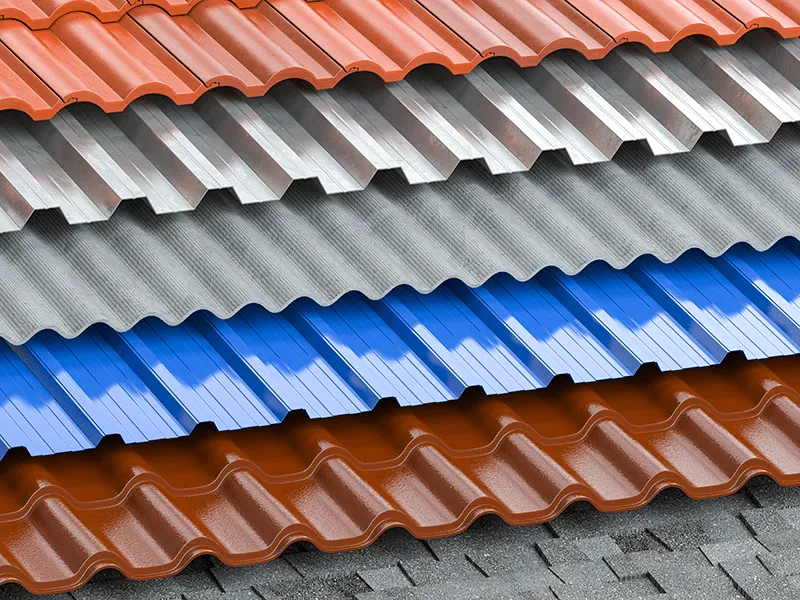
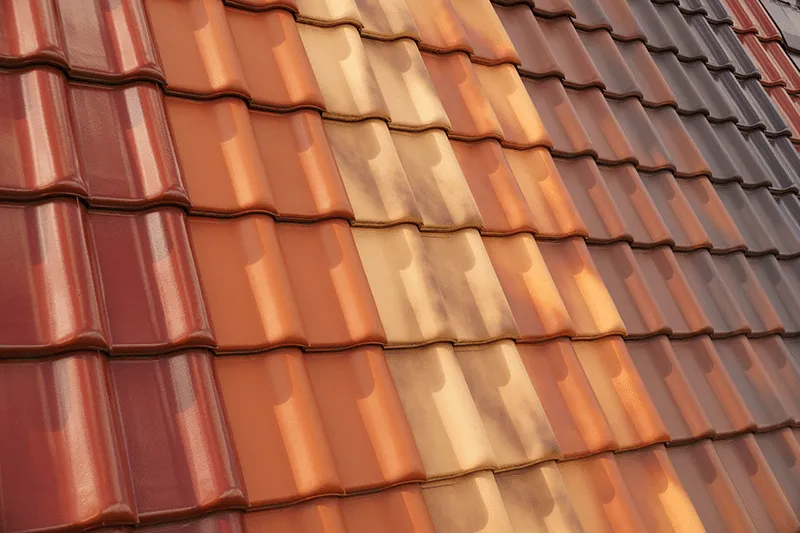
Clay And Concrete Tiles
Clay and concrete tiles are also popular roofing materials for residential homes. They offer a classic look that can enhance the visual appeal of your house’s exterior.
Clay and concrete tiles are also durable, lasting up to 50 or 100 years depending on the type of tile you choose. Additionally, they’re known for their fire-resistance and soundproofing qualities, making them ideal for homes located in busy neighborhoods or near airports.
However, installing clay and concrete tiles is a labor-intensive process; it takes several days to properly secure each tile onto the roof structure. Moreover, they’re relatively heavy compared to other materials like asphalt shingles or metal roofs; this means that extra support may be needed if your home’s foundation isn’t strong enough to handle the additional weight. In addition, replacing broken tiles can be time-consuming and costly due to their intricate design.
Despite these drawbacks, clay and concrete tiles have some major benefits that make them worth considering for residential roofing projects. Their natural insulation properties help reduce heating costs in winter months, while their reflective surface deflects sunlight away from your home in summer months. Plus, with proper maintenance, these materials can keep your home safe from water damage for decades to come – ultimately saving you money in the long run.
Wood Shakes And Shingles
Moving on from clay and concrete tiles, wood shakes and shingles are other popular options for residential roofs. Shakes are split-like pieces of wood that can be used to create a rustic, natural look for your home. These materials are lightweight and easy to install, making them a great choice for those looking for a relatively straightforward roofing project. In addition, they’re known to be fireproof and insect-resistant, providing additional protection from the elements.
On top of that, wood shakes and shingles are often cheaper than other roofing materials – especially when you factor in the cost of installation. However, these materials don’t last as long as other options like metal or tile; you may need to replace them every 10-20 years depending on the weather conditions in your area.
Additionally, if your home is located near saltwater or in an area with high humidity levels, wood shakes, and shingles may not be the best choice; they can quickly become warped due to moisture exposure over time.
If you do decide to use wood shakes or shingles for your roofing project, it’s important that you maintain them regularly. This includes performing routine inspections for signs of damage and replacing any broken pieces immediately. With proper care and maintenance, you can ensure that your roof looks great and lasts for decades to come.
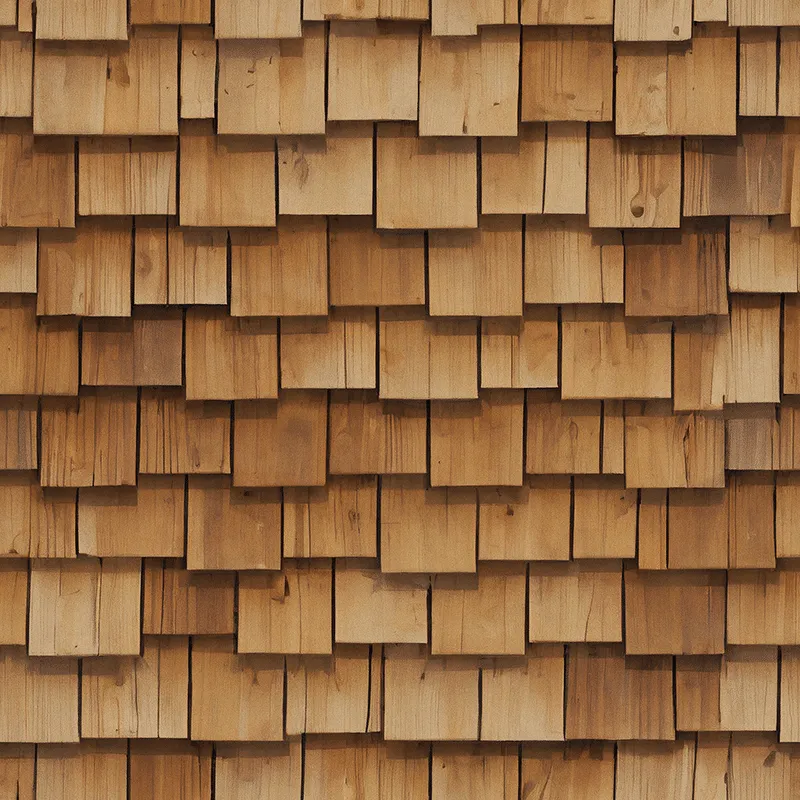
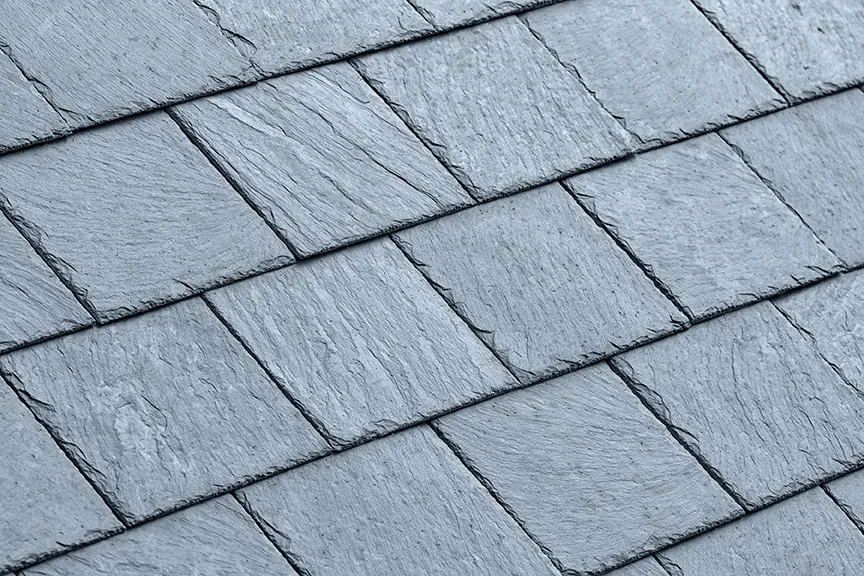
Slate Tiles
Slate tiles are another popular option for residential roofing that offers a unique look and durable protection. These tiles are made from natural stone, making them incredibly strong and resistant to damage. In fact, slate tiles can last up to 50 years or more, depending on the quality of the material – making them an excellent long-term investment.
Unlike wood shakes and shingles, slate tiles require a bit more knowledge and skill when it comes to installation. Furthermore, they’re much heavier than other roofing materials; you may need to reinforce your roof’s structure before installing slate tiles in order to prevent any structural issues down the line. Additionally, since slate is a natural material, it can be expensive compared to other options like asphalt shingles.
Despite these drawbacks, there are still many benefits of using slate tiles as your residential roofing material. For starters, slate has an attractive appearance that can add character and charm to any home.
Plus, due to its weight and strength, it provides superior protection against inclement weather such as hail or wind-driven rain. And finally, its longevity ensures that you won’t have to worry about needing to replace your roof anytime soon – allowing you peace of mind for years to come.
Rubber Membranes
Now, let’s take a look at rubber membranes as an option for residential roofing. Rubber membranes are a type of synthetic roofing material that can provide excellent protection against the elements.
These membranes are made from ethylene-propylene-diene monomer (EPDM) rubber, which is a highly durable material that can withstand extreme temperatures and harsh weather conditions such as heavy rain and snow. Additionally, rubber membranes are lightweight compared to slate tiles, making them easier to install – plus they’re relatively inexpensive in comparison.
However, there are some drawbacks associated with using rubber membranes for your residential roofing needs. For starters, these membranes don’t offer much aesthetic appeal; they generally appear flat and featureless compared to other types of roofing materials like asphalt shingles or wood shakes.
Furthermore, if the membrane isn’t properly sealed around the edges or vents it can lead to water damage over time. And finally, because rubber membranes don’t last as long as slate tiles – typically between 10 and 20 years – you may need to replace them more often than other types of roofing materials.
Despite these drawbacks, rubber membranes still offer some advantages when it comes to residential roofing. They’re quick and easy to install due to their lightweight and flexibility – plus they’re much less expensive than other materials like slate tiles or metal panels.
Additionally, they provide superior protection against UV rays which can help reduce energy costs by keeping your home cooler in the summer months. All in all, while rubber membranes may not be the most visually appealing option on the market – they certainly have their benefits when it comes to protecting your home from the elements.

What Is the Easiest Residential Roofing Type to Install?
When it comes to residential roofing, many homeowners are interested to know which types of roofs are the easiest to install. While every roofing material has its unique benefits and drawbacks, two types of roofs are generally considered the easiest to install: these are metal tiles and asphalt shingles.
Metal tiles are known for having a variety of styles and colors, and they can be installed quickly and easily by a professional roofing contractor.
Asphalt shingles, on the other hand, are known for being the most popular type of roofing material. This material is made from a fiberglass base that is coated with asphalt and granules, giving them a unique characteristic appearance. They are also known for being lightweight, easy to handle, and easy to install.
While both metal tiles and asphalt shingles are easy to install, it’s still important to take note to hire a professional roofing contractor to ensure that the installation is done efficiently and correctly. A professional roofer like Blue Nail Roofing & Construction will have the necessary training and experience to handle any challenges that may arise during the installation process and ensure that the roof is properly installed to protect your home. Contact Blue Nail Roofing & Construction today for your residential roofing service project. We are known in the industry for providing professional and high-quality services to our dear clients. So, what are you waiting for? Get in touch with us now for more details about residential roofing installation.

